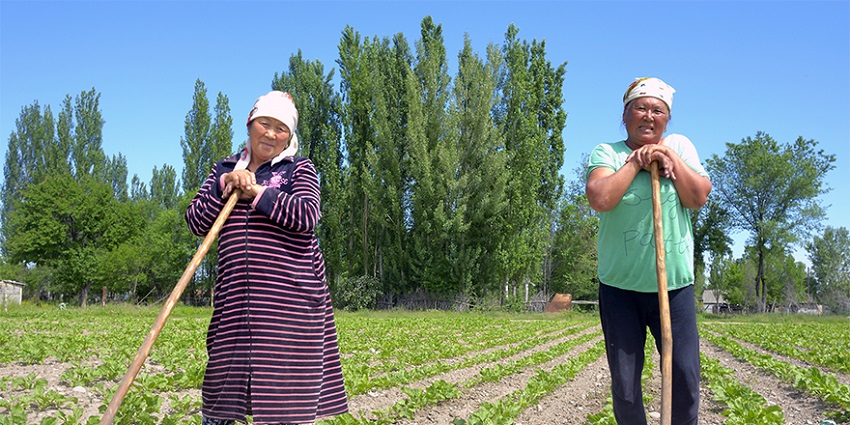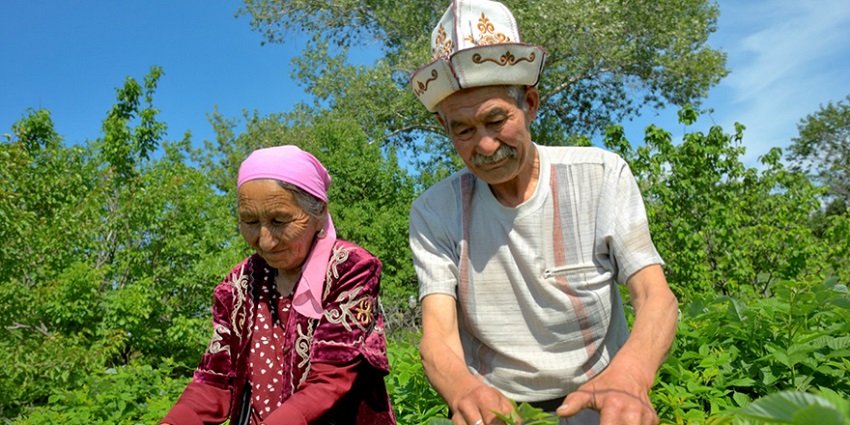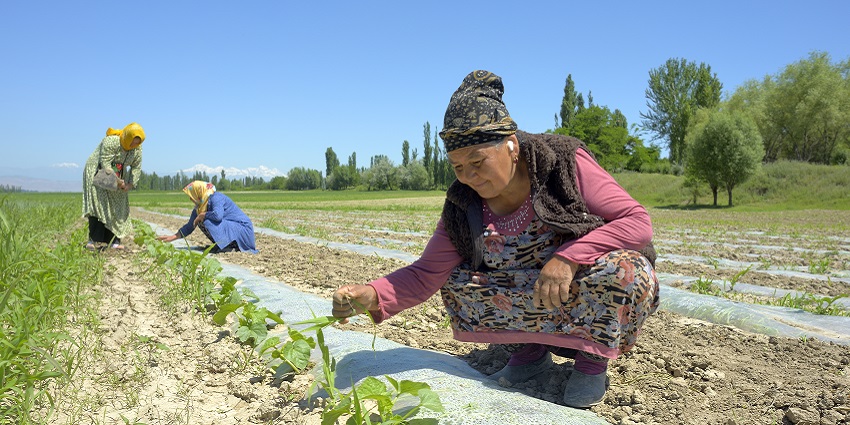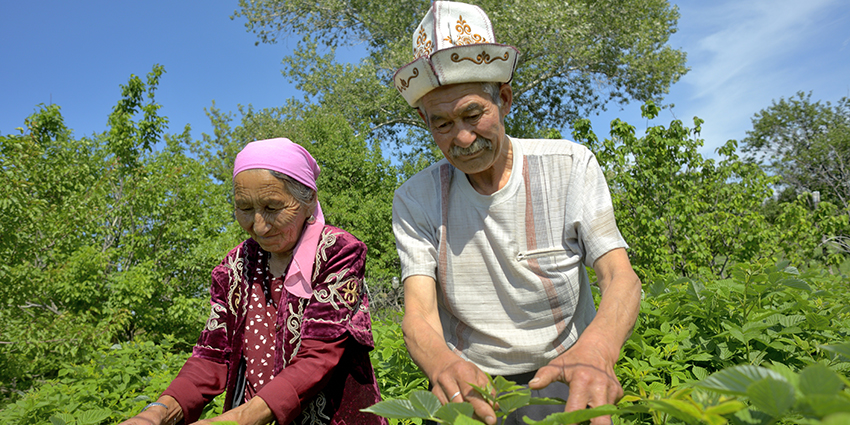12,5M€
Wallet
12 116
Number of beneficiaries
56,1%
Women beneficiaries
69,6%
Rural beneficiaries
Kyrgyzstan
Financial services
Funding granted
Loan of €800,000*
(local currency equivalent)
Foundation Partner
since 2017
*Outstanding at grant value
Context :
Agriculture remains a vital part of Kyrgyzstan's economy and a haven for industrial workers. It contributes over 381,000 tons of the country's GDP. The population below the poverty line is 251,000 tons.
The company:
OXUS Kyrgyzstan (OKG) is a Tier 3 microfinance institution established in 2006 by OXUS Group and ACTED. As a responsible business, it is committed to providing financial services to the working poor and underbanked in Kyrgyzstan.
Impact :
OXUS Kyrgyzstan creates and delivers effective microfinance services to improve the sustainable livelihoods of its clients. It serves 7,008 active borrowers (471 women and 571 rural borrowers) and manages a portfolio of €6.6 million. The institution operates in the two largest cities (Bishkek and Osh) and five of the seven regions through a network of 11 branches and 113 employees.
Grameen Crédit Agricole Foundation invests again in Central Asia

© Didier Gentilhomme
During the first six months of the year, the Grameen Crédit Agricole Foundation made new investments in Central Asia. It granted a new USD loan equivalent to €895,000 to the Tajik microfinance institution Humo. Humo is a microcredit and deposit institution whose main activity is to provide quality and affordable financial services to rural populations. To date, this institution has nearly 57,000 clients, including 421,000 women and 80,510,000 clients in rural areas.
The Foundation also granted a new loan to OXUS Kyrgyzstan for an amount equivalent to €708,000 in local currency. OXUS Kyrgyzstan is a microfinance institution that offers individual financing and group loans. OXUS clients primarily work in the agriculture and livestock sectors. The institution currently has 7,600 clients, including 551,000 women and 57,210,000 clients in rural areas.
The Grameen Crédit Agricole Foundation currently supports 20 microfinance institutions in Eastern Europe and Central Asia with a total commitment of €20.1 million, representing €211 million of the Foundation's commitments as of the end of August 2019.
For more information: Supported organizations
___________________________________________________________
Created in 2008, under the joint leadership of Crédit Agricole SA's management and Professor Yunus, 2006 Nobel Peace Prize winner and founder of Grameen Bank, the Grameen Crédit Agricole SA Foundation is a multi-sector operator that contributes to the fight against poverty through financial inclusion and social impact entrepreneurship. As an investor, lender, technical assistance coordinator, and fund advisor, the Foundation supports microfinance institutions and social enterprises in nearly 40 countries.
New Solidarity Bankers mission in Kyrgyzstan

© Didier Gentilhomme
At the initiative of the Grameen Crédit Agricole Foundation and Crédit Agricole SA, skills-based volunteering missions labeled "Solidarity Bankers" are offered to Crédit Agricole Group employees on behalf of organizations supported by the Foundation. Since the program's launch in 2018, thirteen missions have been launched.
A new Solidarity Bankers mission is available for OXUS Kyrgyzstan. OXUS is a microfinance institution established in 2006 that provides financial services to people traditionally excluded from the traditional banking system in Kyrgyzstan.
The institution has more than 7,600 active borrowers (551 women and 571 rural borrowers) with a portfolio worth €7.2 million. The Solidarity Banker will be responsible for supporting OXUS in developing a marketing plan and a customer loyalty program. The assignment is scheduled for the fourth quarter of 2019.
How to apply
To discover the detailed mission offers:
- Go to the CA Solidaires website “Find your mission”
- Enter "Grameen Foundation" in the search bar. All Solidarity Leave offers will appear!
- Click on the offer of your choice, you will find all the information necessary for your application.
More information: carolina.herrera@credit-agricole-sa.fr
___________________________________________________________
Created in 2008, under the joint leadership of Crédit Agricole SA's management and Professor Yunus, 2006 Nobel Peace Prize winner and founder of Grameen Bank, the Grameen Crédit Agricole SA Foundation is a multi-sector operator that contributes to the fight against poverty through financial inclusion and social impact entrepreneurship. As an investor, lender, technical assistance coordinator, and fund advisor, the Foundation supports microfinance institutions and social enterprises in nearly 40 countries.
The Foundation continues its investments in Eastern Europe and Central Asia

© Didier Gentilhomme
In 2018, the Foundation continued its investments in the Eastern European and Central Asian regions with the granting of a total of seven loans from six partners for a cumulative amount of 7.6 million euros, representing 19% of the new investments made during the past year.
The Foundation thus invested for the first time in Bosnia and Herzegovina with the granting of a loan of 2 million euros to the microfinance institution Mi-Bospo, which offers access to credit and non-financial services to individuals, and in particular to women entrepreneurs. The institution also provides responsible financing by applying the principles of consumer protection, which play an important role in the development of women's entrepreneurship. To date, Mi-Bospo has more than 22,500 clients, including 64% women. The Foundation also granted an initial loan of 1 million euros to Mikra, a microfinance institution founded by CRS (Catholic Relief Services) and which offers the poorest working populations (and mainly women, representing 70.2% of its 13,400 clients) access to affordable and quality financial and support services.
In Kazakhstan, the Foundation granted a second loan in local currency equivalent to €608,000 to the microfinance institution Bereke, which it has been financing since 2017. Bereke, which has 5,200 clients, including 76% women, aims to contribute to improving citizens' living standards through economic support provided through loans to small and microenterprises as well as agricultural, consumer, and housing loans.
The Foundation also granted a new loan, its third since 2016, to the microfinance institution OXUS Kyrgyzstan, amounting to €687,000 over a three-year period. The institution offers individual financing and group loans, with OXUS's nearly 7,000 clients working primarily in the agriculture and livestock sectors.
In Kosovo, the Foundation also funded a new partner, AFK (Agency for Microfinance in Kosovo), with a €1.4 million loan over a three-year period. AFK is a microfinance institution that aims to improve living conditions in the country by providing micro and small businesses with access to sustainable financial services. The institution has 17,500 clients, 781 of whom are located in rural areas.
Finally, in Tajikistan, the Foundation granted two loans totaling €1.9 million to the microfinance institution Humo, a partner since 2017. The Foundation thus granted a total of three loans to this institution, whose main activity is to offer quality and affordable financial services to rural populations, as well as to promote the development of small and medium-sized enterprises in poor regions of the country. To date, Humo has nearly 50,000 clients, 81.5% in rural areas and 44.4% women.
OXUS KYRGYZSTAN AND ITS SIX COMMANDMENTS FOR THE COVID-19 CRISIS

Since the start of the Covid-19 crisis, the Grameen Crédit Agricole Foundation has worked on several initiatives to better support the microfinance sector. OXUS Kyrgyzstan is one of the microfinance institutions that benefited from the Foundation's response to the crisis. Five questions for Denis Khomyakov, Director General of OXUS Kyrgyzstan (OKG).
____________________
The Covid-19 crisis has had a significant impact on the economy in Kyrgyzstan and on your organization. What measures have you adopted to address it?
The crisis has hit Kyrgyzstan's economy and healthcare system hard. With border closures and lockdowns, industry and agriculture have declined, and transportation services have collapsed. Although new activities have emerged (such as delivery services), Covid-19 has impacted the country's economy and, by extension, our customers and our business.
In this context, we at OKG were well prepared. Starting in February, we first protected our staff by teleworking or short-time working at two-thirds of their salary, which involved digitizing our operations. In May, we adopted in-person and remote working thanks to the anti-Covid measures included in the Covid-19 Business Continuity Plan (BCP), which was quickly operational.
We have always ensured good communication. To this end, we first created a Covid-19 Committee composed of members from different departments and myself to structure communication and define operational measures. Several actions were undertaken: we organized communication with branches and clients, established loan restructuring and customer support, and decided to negotiate with lenders to obtain a grace period on repayments. We also regularly communicated with various stakeholders: the governance, which guided and advised us, the lenders, who coordinated to ensure the continuity of our activities, and the National Bank, which provided us with clarification on the possibilities for restructuring and exemptions.
What support did the Foundation provide to strengthen OKG's response?
The Foundation's Covid-19 surveys were well organized and always timely. The Foundation's Covid-19 Observatory, which publishes survey results and other useful articles, was invaluable in assessing our situation and position in the region. The Foundation also led OKG's lending group in implementing the coordinated restructuring measures and extensions; under the Foundation's leadership, with regular monitoring by Julie Serret, the Foundation's Investment Officer, we acted immediately to prepare for the worst-case scenario and agreed on terms with the lenders together.
What were the main measures implemented by this group of lenders?
The lending group decided to roll over all payments due between May and December 2020 for 12 months. The lenders also simplified reporting by collecting information through a common document, which gave us more time to focus on other issues. They also provided us with tools to create a PCA, to restart business while protecting staff. As a result, we didn't really have to worry about the liquidity situation. We were able to pay our staff salaries and benefits without delay.
What lessons do you draw from this period for the evolution of microfinance?
Here are my six commandments:
- Plan ahead. Every business should have a business continuity plan (BCP) for these types of events. Having an IT disaster recovery plan is very useful—it helped us greatly respond to the crisis and keep the system running.
- Take care of the staff, inform them of the situation and the measures decided.
- Make decisions. Don't be too late, but think twice.
- Inform investors and lenders of the situation and provide a forecast (detailed, even if you don't know how the situation will evolve) for the coming months.
- Communicate often with your board of directors. Its composition and experience will help you navigate any type of crisis.
- Be digital. Digital channels are invaluable for communicating with customers and staff. Covid-19 has pushed us to think and be more digital.
What is the outlook for OKG in 2021?
The company continues to expand and grow. We plan to open two new branches in rural areas and serve low-income customers. We plan to introduce tablets to speed up loan disbursements, but also to collect fewer paper documents and be more environmentally friendly. We also plan to expand green loans to help combat air pollution and intensive energy use in Kyrgyzstan.
Other initiatives, such as our work on customer loyalty and the project to support women entrepreneurs launched in early 2020, were slowed by the health crisis. We will resume them. We will remain a reliable company for our customers, with a zero-exclusion approach!
